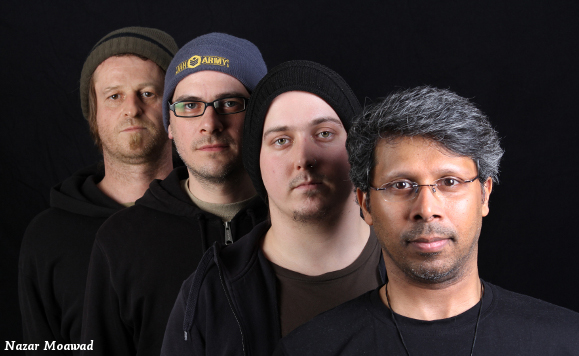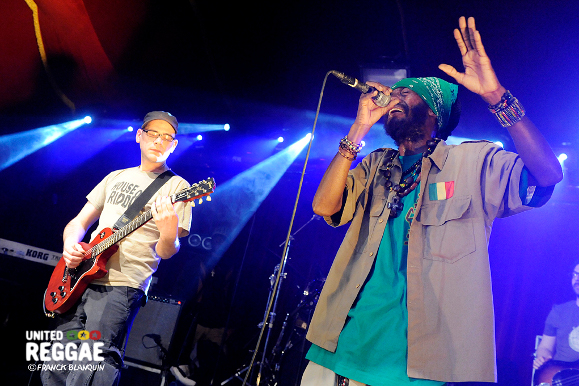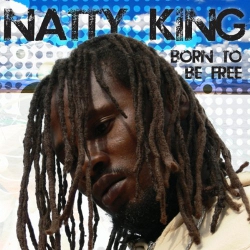Articles about reggae music, reviews, interviews, reports and more...
Interview: Sam Gilly of House of Riddim (Part 1)
- Home
- Articles
- Interviews
- Interview: Sam Gilly of House of Riddim (Part 1)

Interview: Sam Gilly of House of Riddim (Part 1)
"We got a call that we've got to play with Ward 21. They had deposited a CD for us at some gas station in Austria"
Sampler
Austrian workhorses House of Riddim have caused quite a stir internationally in the last years with the release of several well-acclaimed riddims, including the Camel, the Global and the Sensimillionaire, complete albums like Natty King’s wonderful 'Born To Be Free' and singles like Edge Michael & Macka B’s Stand Alone – to name just a few. The list of artists the four members of House of Riddim have worked with reads like a who is who of the Jamaican and European reggae scene, from foundation artists to promising rookies. Time to unfurl House of Riddim’s history to an international audience. In Part I of this interview conducted at Reggae Jam Festival 2011 in Germany, Sam Gilly, the group’s drummer, talks about how he got into reggae music and what it is like to back more than a dozen artists on a single weekend.

How was House Of Riddim born?
I was a drummer in a reggae band, and had just started to build a studio and produce music. I sent out my productions soon. Two people linked up with me then: a label from Munich, Soulfire Artists, and Ganjaman [A German reggae singer from Berlin]. I then flew to Berlin, where we exchanged some riddims. The whole thing just started like that. The colleagues from Munich were important for me, as they had published my first record. I owe both of them very much. Steve [Ganjaman] said "Do it, it's cool", and the guys from Munich released the records. There was a release tour for the first LP. At that stage, we hadn't planned yet to do those backings. On the LP, we had about 14 artists featured, and about eight or nine accompanied us on that tour. But things really took of the following year. Lots of offers to produce came in - you find that on our website. If you look at our discography, in 2004 we had a 7" published and the first LP, and in 2005 quite a lot more already. In 2005, we also did our first backing jobs, about 40 or 50. From there, things developed further. In 2004, we still had the "old" line-up, since 2005 the line-up has been as it is today. Except for the guitarist who came in 2006 because our original guitarist was stressed out. He said: "Hey, I don't want to play a hundred times each year, I can't take it any longer." Since then we've been moving forward continuously. When we're not on a club tour, we're usually producing a lot in winter. During the summer, we're almost always on the road. Those are the basic parameters.
 I started to play music when I was 20 already
I started to play music when I was 20 already
If you grow up in St. Pölten in Austria, how do you get to listen to reggae music?
I have a brother who is eleven years older than me. I can still retell when I was five, six years old... We had to share a room. He was 16 or 17 and listened to Frank Zappa, Deep Purple, Led Zeppelin, Bob Marley, Burning Spear - and I still remember that the first reggae album I ever listened to was Burning Spear. He had brought that one from the Netherlands. I was five or six. That somehow stuck with me. By now, I've also bought that LP. These are my childhood memories. I started to play music pretty late, when I was 20 already.
You mean you started to learn to play an instrument at the age of 20?
Yes, yes!
That is unusual.
When I was already 20. I didn't really have ambitions. This reggae band before House of Riddim - the guys were called Roots Vibration - the situation was, we all knew each other, hey, we start a band and we need a drummer. "You're the drummer." Fuck, I am no drummer, I don't even have a drum kit... The bass player and I then went to Vienna to buy a drum kit for me, at some flea market. It actually was my second drum kit, my parents had once given me one. But it was just boom boom boom, nothing serious. It was just there. At the age of 20, I had actually started to play drums.
Did you take lessons?
No, I didn't. In my life, I took two hours of lessons. One was drumstick grip with a classical percussionist, and the other was music reading, also an hour. I just played, played, played. Years later, when I decided I wanted to try and make a living from music, I taught it at a school. I did that for seven years, until I said f*** you. That does not interest me at all. And that was exactly this sticking point where we had started to build a studio. This band, Roots Vibration, was about to cease to exist. I said cool, I start something new. I simply want to produce things. And that was precisely the time where I stopped to teach. I told my wife at that time, (she was) heavily pregnant: "I quit. We try that now." - "Are you crazy?" It worked out, thank God it worked out. It could have went wrong badly. Since then I am doing nothing else than House of Riddim.
 I told my wife when she was pregnant I'd quit my job
I told my wife when she was pregnant I'd quit my job
You are busy enough with that. You have just backed 17 artists this weekend alone...
Maybe. A lot... 16, 17, 15 - I don't know.
How do you prepare yourselves to play with so many different artists?
It depends. It doesn't happen every weekend. For some reason, the people around Sheriff [The organizer of Reggae Jam Festival in Bersenbrück, Germany] love us. For us, this is the most beautiful festival ever, because it's still small, it is no maximum security prison. Everyone knows everyone, and they're all nice. It's really, really enjoyable here. In the summer, of course, if we are at a festival - and then again, there are not that many in Europe - it is often like "Oh, the band could also back this guy and that guy..." Of course you can do that. But usually it is not as heavy-metal like as it is here. Of course it makes sense for the organizers, if a band that is there already backs two or three artists. Most artists travel without a band, or use a European band, in order to keep costs down. And the preparation for that - if it is a tour like the one with Fantan Mojah last year, a tour of six weeks, that is easy. He sends the tracks, everyone listens to them, hears the chords, then one meets in the studio and plays it through a few times. Then one or two days with the singer, to get it tight, so that you no longer need to think, and then you go on tour. The rest is just fun, more or less. Well, fun - it is arduous, but you do not have to think any more then.

For backings like here it works somewhat differently, because we usually never get the riddims that they want to play early enough. And that is always in our peak season, where we always are somewhere. That actually works out relatively fast. Everyone prepares himself at home, and we have the time to meet us and figure out how it works. But there's things been happening - I swear. Samples cut in the night liner and stuff, because we got a call, hey, you gotta go there and there, you gotta play with Ward 21 there. These guys had deposited a CD for us at a gas station somewhere in Austria. We came from a festival in Hungary and picked up the CD. Our keyboard player sat down four hours cutting the samples and writing down the chords. We went to the festival and played with them. Suicide mission! But it was one of the wickedest shows ever. Happens. Rare, but happens. The more time for preparation, the easier it is. Nevertheless, it's like now you've got everything in the can, everything is tight, everyone knows what it is about - and you don't know the singer.
As today with Super Beagle. He sent us 12 tracks, but then he stands there like: "What's that tune? I don't know it. Forgot the lyrics. Can you play this, can you play that." That's always tricky. Apart from that, on stage - if you do not know the singer, you don't know how he acts. You didn't rehearse with him, you don't know when comes which part. You gotta watch what he does. In the best case - most of the time that is the case - he gives you signs. That works great with dancehall artists and old-school artists, all cool. But it doesn't work with Etana, for instance. We played a show with her, but we had rehearsed with her prior to it. She has her flow standing there in front of us and just wants to embed herself into the playback. She doesn't give any hints. She wants this and that at exactly this time, but doesn't give you signs. That again is quite different.
A weekend like this one at the Reggae Jam festival, does it pay off for you financially at least?
Well, yes. We all make a living from it. Well, not from Reggae Jam alone (laughs). That would be nice - playing one weekend, followed by 360 days off.
How does one persevere a tough weekend like this one?
How do you persevere that… It's all relative. Everyone does his job. If you go to work 40 hours per week, you have the huge advantage that everything is regulated - from eight to four or whatever, five days per week, and you can plan everything ahead of time. For us, things are different. But in total, we do have our leisure time. Tomorrow for example. I'll be in Vienna at around four, take a taxi, jump aboard a train and go home. I'll be home at around six. And you know what I do then? I take a trip to the seashore, for four days. Four days. It's not much, but four days with the children, with my wife, and then I continue working. That means: they all have to comply with me, but on the other hand we're that adjustable that other things… I can say: "Yo guys, it's Monday, let's take a trip." If you have a regulated job, that would be difficult. You'd have to call the boss or visit a doctor and tell him you're not feeling well. It has advantages and disadvantages. But in the end, what I'm doing is also just a job. What matters in the end is that you have fun doing your job. Every job is simple and easy, if you have fun. Doesn't matter whether you are a construction worker or whatever.
Do you still have fun on Sunday evening at eight?
Yeah. Well, today I briefly had no fun because I was interrupted while eating, and regarding that I don't joke. But it's all cool.
 Authentic? The world champion of yodelling is a Japanese
Authentic? The world champion of yodelling is a Japanese
You produce lots of riddims for and entire albums with Jamaican artists. How do you comment on that debate in Jamaica on reggae in Europe and authenticity?
Define authentic! What is authentic? It is music, basically it's just music. There are now so many amazing producers who do not come from Jamaica, and many Jamaicans go to these producers to get a fresh sound. I'm not valuing here. It is simply a different style. Authentic? Define that. The world champion of yodelling is a Japanese, as far as I know. That was not invented there. It's just music. Or could you tell that the band playing right now is not Jamaican [Etana performs in the background during this interview, backed by the French band Dub Akom] Nope.
The last Natty King album (Born to be Free)...
 ... we produced that. Manfred, the bass player, and I. We also provided most of the instrumentals, except for two riddims, I guess. A very nice album, but it got very little approval in Europe.
... we produced that. Manfred, the bass player, and I. We also provided most of the instrumentals, except for two riddims, I guess. A very nice album, but it got very little approval in Europe.
The reviews were great.
Those were super, and if I recall it correctly most copies to date were sold in France. France is a good market.
Do you play there from time to time?
Rarely. Very, very rarely.
The artists you back here are usually pretty thrilled. I can remember Glen Washington, who was really enthused about you, although he had initially had reservations. Last year Admiral Tibet thanked you several times before you went to your hotel on Sunday night.
Makes me happy.
How does it feel to play with artists whose music you enjoyed pretty much your entire life?
Strange. Quite strange. I can remember things like… Years ago, Ranking Joe had been in our studio. You know where I live, it's deepest countryside. It is not even close to Vienna. It's a one hour drive from Vienna. A small village with a baker, a butcher, and a small hotel. Ranking Joe spent a few days there and talked about things you only know from Wikipedia or from some reggae encyclopedias. They're all like that. Frankie Paul… We had a short tour two or three years ago with Frankie Paul. I started to buy his LPs 20 years ago. Or U-Brown, Ranking Joe, (Everton) Blender… I have all of Blender's records at home and all of a sudden we are on tour with him! I thought holy shit, I grew up with his sound, and now I talk to him and have a beer with him. Pretty cool.
 I have all of Blender's records at home and all of a sudden we are on tour with him!
I have all of Blender's records at home and all of a sudden we are on tour with him!
How is it for the Yardies to visit you in studio - a completely different world?
Studio is studio. We have a well equipped one. We have something like a plan when we record, everything works pretty swiftly. With the Jamaicans... It is different, it depends on their attitude. In times of the Internet... We already did some strange productions. For example, the last Sugar Roy and Conrad Crystal LP (Universal Tribute to Gregory Isaacs). Do you have that one? Strongly recommended. You need to get it, a wicked album. We recorded it here in our studio, sent the files back to Jamaica, where they went into Tuff Gong to record the horns and Bongo Herman on percussions. They added the vocals and sent everything to London via FTP for the mixing, then to New York for mastering, then back to Austria for distribution. And everything within a very short period of time. Things have become so fast... Things have been happening already like we send out a riddim - early in the morning, when he wakes up, it is about 3 p.m. here. He goes into the studio to voice it and sends it back five hours later. I mix it, send it back and he publishes it the next day. It would never have been possible formerly. I'm not saying now that this is good - it is just the way it's done today. These opportunities are fantastic. You do not have to fly around half the world. It is of course much cheaper than sending tapes.
Read more about this topic
Read comments (2)
| Posted by JAMIE IRIE on 11.12.2012 | |
| Sam Gilly is one ofthe best guys in the world plus a brillant drummer and general nice person. | |
| Posted by Pitah Kwezai on 11.12.2012 | |
| Sam is a respected brother here in Austria, a usually quiet guy who expresses himself more in his work..music. This is a very interesting interview, thanks for featuring. House Of Riddim as a band are very hard working.... so they are rewarded through their hard work, basically. Jah bless. | |
Comments actually desactivated due to too much spams
Browse by categories
Recommended Articles
Latest articles
Recently addedView all
© 2007-2025 United Reggae. All Rights Reserved. Reproduction in whole or in part is prohibited. Read about copyright
Terms of use | About us | Contact us | Authors | Newsletter | A-Z














